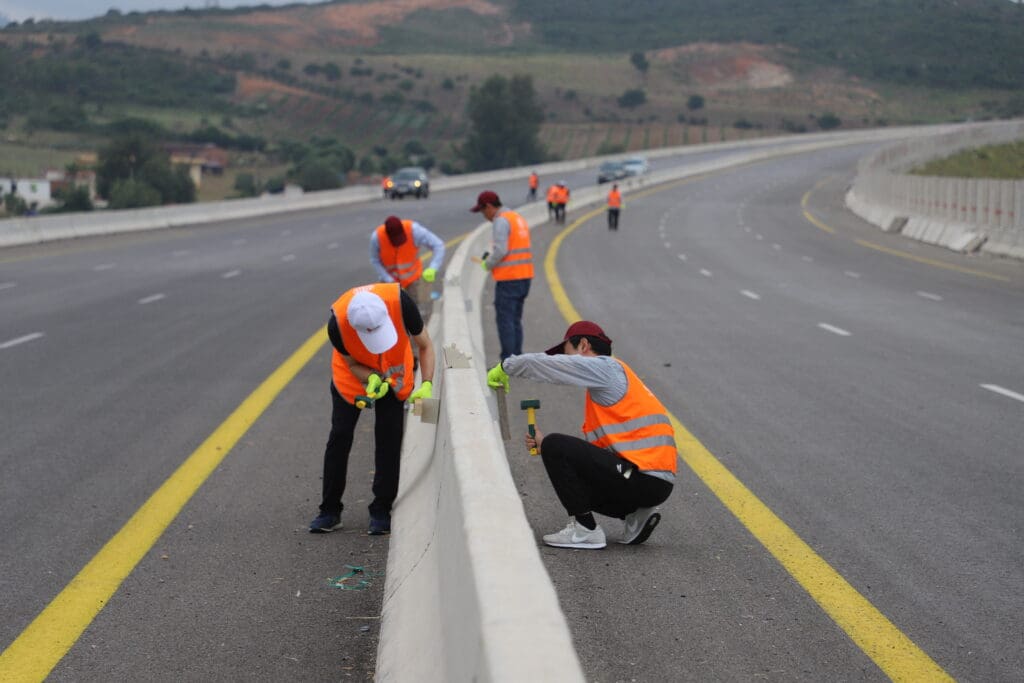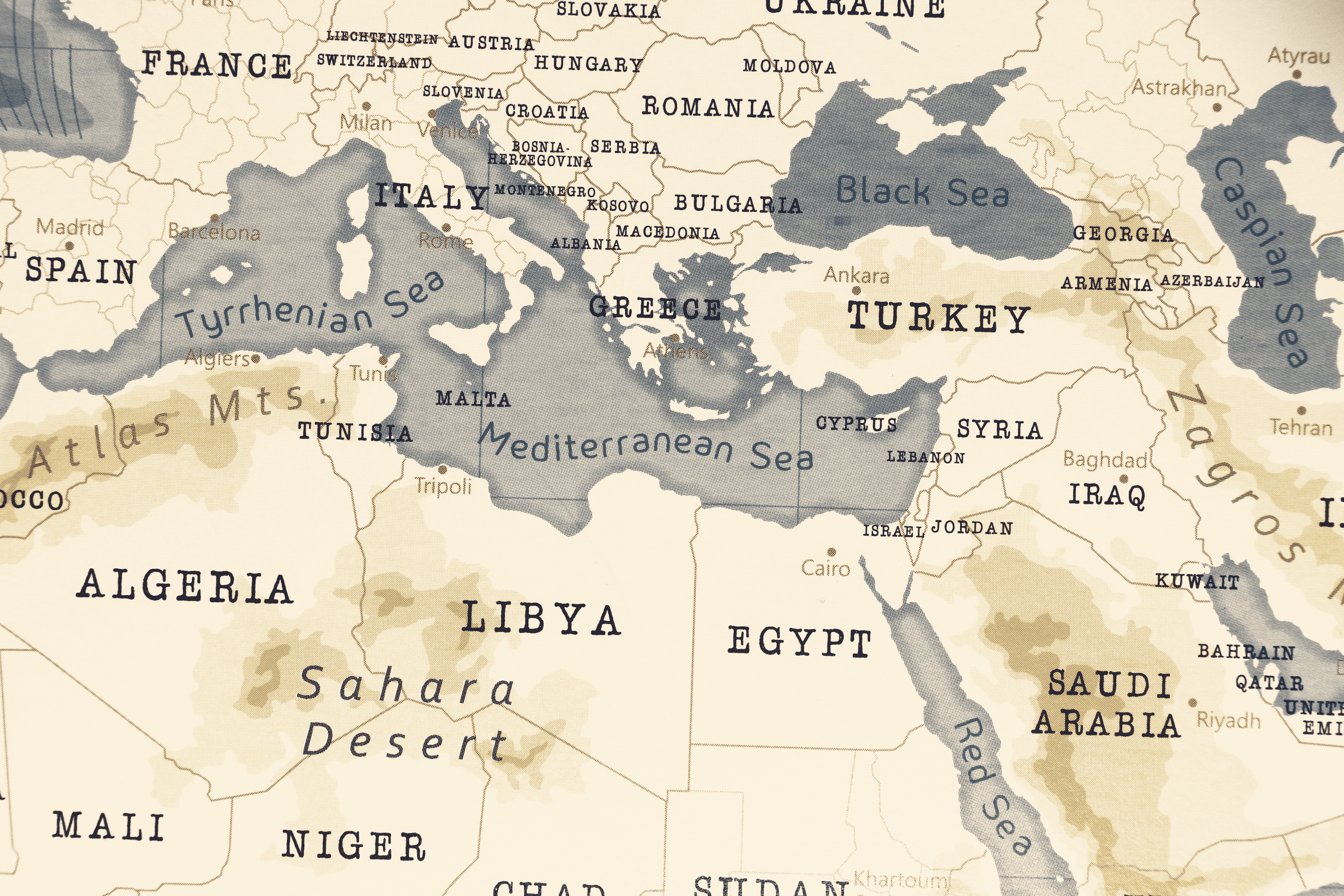
Three Ways that China Engages with the Mediterranean
April 2025
China and the Mediterranean have seen a long history of engagements. The ancient Silk Road, Marco Polo, and Ibn Battuta all serve as historical and cultural symbols of the connections between the two regions.
Relations between China and North Africa have grown since the founding of the People’s Republic of China (PRC) in 1949, boosted by mutual political support for their struggle for independence such as mutual supports between China and Algeria and between China and Egypt. Economic relations between China and the northern side of the Mediterranean have also grown robustly since China’s reform and opening-up policy in the late 1970s and early 1980s. Today, the Belt and Road Initiative (BRI) defines engagements between China and those two Mediterranean sub regions more than anything else.1
As China has become a power with global influence, its relations with the Mediterranean region will expectedly grow considerably. China’s interests in the Mediterranean will also grow. However, unlike other external actors, China does not have an integrated engagement strategy. In China’s vision, the Mediterranean is actually a combination of some parts of South Europe, North Africa, and the Middle East. China publishes its foreign policy objectives in Europe,2 Africa,3 and Arab countries,4 respectively, but never about the Mediterranean as a whole.
Analysis of China’s role in the Mediterranean is available within China’s overall foreign policy principles and structures. Despite the multi-faceted nature of China’s policy in the region, the following three principles are particularly worth mentioning: adhering to the friendship legacy of the shared fight against colonialism; promoting reconciliation; and advancing unity through BRI as an economic engagement approach.
The Case of Adhering to Friendship Legacy
The mid-19th century British statesman, Lord Palmerston, once said: “There are no permanent friends or enemies in geopolitics, only permanent interests.”
Though widely enshrined, China never took this approach as a principle to handle its relations with other countries. On the contrary, China purports to adhere to its friendship legacy by developing relations with these countries. While meeting with African leaders, Chinese leaders would always bring up the history of mutual support in the anticolonial fight for independence from the 1950s through to the 1970s. For instance, while meeting with Algerian President Abdelmadjid Tebboune on July 18, 2023, President Xi Jinping said: “The two countries have been true friends and natural partners in the pursuit of common development and national rejuvenation.”5
China’s efforts to maintain its relations with Algeria serve as a typical example in this regard. The 1950s and 1960s saw Algerians enter into one of the most arduous wars for independence against colonialism in the history of humankind. China had resolutely supported the struggle of Algerians by providing political, economic, and military assistance. When France withdrew its personnel and staff from Algerian medical facilities in the late 1950s, China filled the gap for Algerians with medical teams. This later became China’s regular practice in its relations with newly independent African countries.6
Support and assistance are always mutual. Algeria had also lent a hand to China in its major international agenda. In 1971, Algeria, together with Albania, proposed a resolution to the United Nations General Assembly endorsing China’s resumption of its seat at the UN, which was one of the most consequential events in UN history.
This friendship, borne out of mutual support, has withstood the test of time. In 2014, China and Algeria formally announced their Comprehensive Strategic Partnership,7 one of the first between China and Arab countries. In addition to persistent dispatches of medical teams for more than 60 years, China had supported Algeria with various large projects, for instance, the construction of Algeria’s East-West highway, which was finally completed in 2023.8 Strategic factors could be one of the considerations, but friendship always served as a pillar between the two.
Algeria is not the only North African country with whom China demonstrates its principle of valuing friendship. Egypt, among others, is another example. China has contributed greatly to Egypt’s economic and infrastructure development. The Suez Economic Zone (SEZ) and the New Capital Project are two such development projects where China invested tremendous economic resources.9 The SEZ attracted more than 6 billion U.S. dollars in the year 2023-2024, 40 percent of which were coming from China.10
The Case of Promoting Unity
The colonial strategy of divide and rule has been applied in the practice of global governance. The Mediterranean region and the Middle East are two regions that have been seriously affected by this approach. China, conversely, has promoted unity and reconciliation as part of its traditional philosophy in statecraft.
Despite persistent turbulence in the region and its reverberations across the world, China regards development as its top priority11 by maintaining peace and stability as a way to safeguard the needed environment for development. China believes that so long as it can persist in its development agenda, it will be able to solve most of the problems it faces today.
Most recently, China has invested tremendous political and economic resources, promoting reconciliation and unity throughout the region. In early March 2023, China hosted negotiations between Iran and Saudi Arabia, which led to reconciliation between the two major conflicting parties of the Gulf.12 On July 23, 2024, the fourteen Palestinian factions reached a settlement in Beijing,13 paving the way for the future political reconstruction of Palestine.
Despite the instability caused by the atrocities perpetrated in Gaza, other adjacent regions like the Gulf have remained largely stable. China’s consistent efforts in promoting the reconciliation between Iran and Saudi Arabia is arguably among the main reasons for this continued stability. This needed stability across the Gulf has served the interests of the region, China, and those of the world as well.
The above-mentioned two cases are widely reported, but China’s efforts go far beyond. Though less noticed and reported, China has long adopted the principle of developing relations with Arab countries as a whole. The China-Arab Cooperation Forum is a multilateral mechanism, manifesting China’s efforts in promoting Arab unity instead of a divide and rule approach.
The Case of Promoting BRI
In the absence of an integrated policy toward the region, the Mediterranean is a natural part of China’s efforts to push the BRI forward. Both the geographical and cultural nature of Silk Road’s history necessitates China to invest its efforts in the Mediterranean region.
Greece should be a typical example of BRI partnership. At the end of 2000s, Greece was struggling with financial crisis, and the Piraeus port—an essential part of Greece’s economy—was in serious depression. It was against this background that cooperation with the Chinese side began. Since then, the Piraeus port has seen dramatic growth in container throughput. In 2010, the port was struggling with container throughput of 0.88 million twenty-foot equivalent units (TEUs), but has reached over five million TEUs in recent years.14
According to reports, Greece stands out among other countries for its sharp growth in the real value of the stock market, which rose by 43.8% from 2022 to 2023.15 Investment grew by about 15.1% in 2024, more than double compared with the year before. In 2023, Greece led The Economist’s annual ranking of rich-world economies.16 All these positive changes have constituted a sharp comparison to the general picture of economic problems across southern Europe. Greece’s success story in overcoming the financial crisis could be attributed to various reasons, one of which should be BRI cooperation.
Greece is just one example in BRI cooperation, which also features other countries in the region, such as Algeria, Egypt, Morocco, and Italy—all of which enjoyed success. Although, geopolitical obstacles are growing, for instance, Italy withdrew from BRI out of pressure from the United States. China will persistently move forward with BRI for the benefit of China and the region.
Conclusion
The Mediterranean is integral to China’s vision of the world, despite the lack of a uniform policy toward it.
Relations between China and North Africa, through the passage of time, are defined by the friendship legacy of the joint struggle against western colonialism. The future will see China accommodate this friendship with its new policy initiatives and agendas.
China perceives the west of Middle East as a region of turbulence as a result of divide and rule used by some hegemonic powers. China will continue to play a role in promoting unity and reconciliation both for its sense of responsibility as a major leading actor and its economic interests that prefer a stable regional environment.
The shared efforts to foster BRI will define China’s engagements with all three parts of the Mediterranean—West Asia, North Africa, and southern Europe. South European countries serving as a logistic juncture, linking to other parts of Europe, will play a particularly significant role as partners with China in this regard.
Though disproportionate with its economic and political status in the world, China’s role in the Mediterranean will grow, and hopefully will have positive long-term implications.


